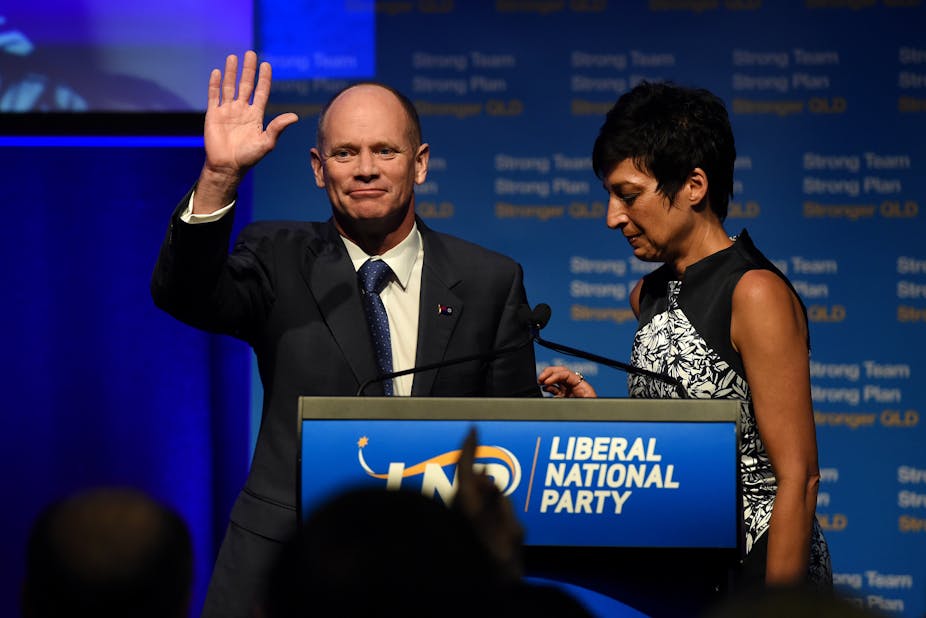The rout in Queensland is shocking news for Tony Abbott. It will terrify federal backbenchers and further destabilise his leadership.
It puts up in lights that the unpopular federal Coalition could easily become a one term government.
That the Liberal National Party would be on the brink of losing Queensland – with the ABC’s Antony Green predicting a Labor win as the most likely outcome – was almost inconceivable before the vote, given the massive majority that Campbell Newman won just three years ago. A swing of more than 11% to the ALP in one election is mind-blowing.
Newman’s unceremonious demise in his seat of Ashgrove had been on the cards; he was on the nose in the electorate and Labor’s Kate Jones, a former minister in the Bligh government, had run an intense and effective grassroots campaign.
State factors – especially the government’s assets leasing plan, Newman’s cuts and his arrogant style – were the primary drivers of the Queensland result, as Labor’s Wayne Swan conceded on ABC TV.
But Abbott is clothed in some of the blame and, given his weakened position, the implications for him will be very serious.
Abbott was totally banned from the campaign because he was considered toxic by the Queensland LNP. His knighthood for Prince Philip was a distraction in the final week and particularly bad for Newman’s seat. The government’s to-ing and fro-ing over Medicare could not have been worse timing.
Most importantly, people see the Abbott government as having the same arrogant style as the Newman one. “Two peas in a pod,” as Swan put it.
Queensland Treasurer Tim Nicholls, who is a possible successor to Newman as leader, said: “There were certainly federal factors, and there were less than helpful things.” He referred to discussion about raising the GST, as well as the Medicare co-payment and the knighthood.
The waves from Queensland will rock the federal ship. Federal LNP backbencher Jane Prentice was blunt. “We need to take lessons,” she said. “We can’t continue as we are”.
Prentice said that last week she had told Abbott – who has been ringing around the backbench in recent days – that “you are not taking the people with you; we are not explaining why we are doing things”.
Asked whether there would be a challenge to Abbott’s leadership, Prentice pointed to his Monday speech to the National Press Club and said it would be “pivotal”.
This appearance will now be massively difficult for Abbott. It’s already been briefed out that his unpopular paid parental scheme will be put on ice. But he’ll need a lot more than a belated burying of a negative.
A Galaxy poll in the Sunday Telegraph, coming after his horror week, shows how embattled he is. The government is trailing 43-57% in two-party terms. The Coalition’s primary vote is down to 36%. That would represent a wipeout if an election were held now. In the poll, Abbott is behind Bill Shorten as preferred prime minister, 27-44%. Shorten campaigned extensively in Queensland.
Abbott is caught in the familiar cycle of a failing leader. Ministers are trying to shore up his support. “Everyone wants Tony to succeed,” Attorney-General George Brandis said on Sky. The cabinet to a person was behind Abbott and “structurally this government is solid and united”.
Liberal deputy Julie Bishop, who with Malcolm Turnbull is a touted alternative if there were to be a change, is reported in the Sunday Telegraph as assuring Abbott she is not campaigning for his job.
As MPs say the government must get out its message much better, Turnbull has notably made the point, in a speech delivered in Los Angeles, that leaders must be “explainers and advocates, unravelling complex issues in clear language”.
Indeed. Something that Abbott has not been able to do.
Among the lessons from Queensland are that reform is extremely hard; getting the voters to accept big changes is vital but difficult for governments these days; leaders will be cut little or no slack; and when politicians breach trust they’ll pay a hefty price.
Above all, voters won’t tolerate leaders and governments who believe they can win power and then get away with thumbing their nose at those who elected them. The voters’ response is “off with their heads”.
After Queensland it has become impossible to predict where things will go federally, including who will lead the federal Liberals to the next election, and what the likely result of that election will be.
Read more of The Conversation’s Queensland election 2015 coverage.

